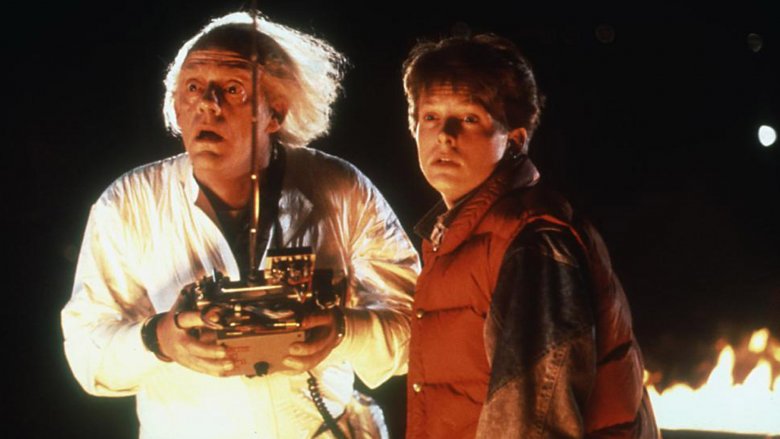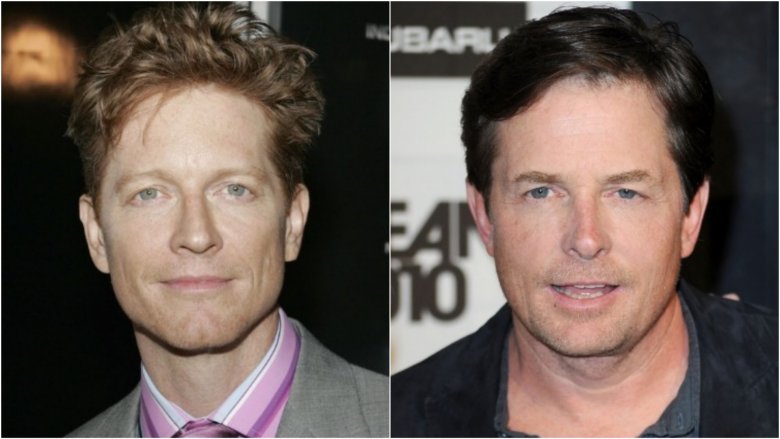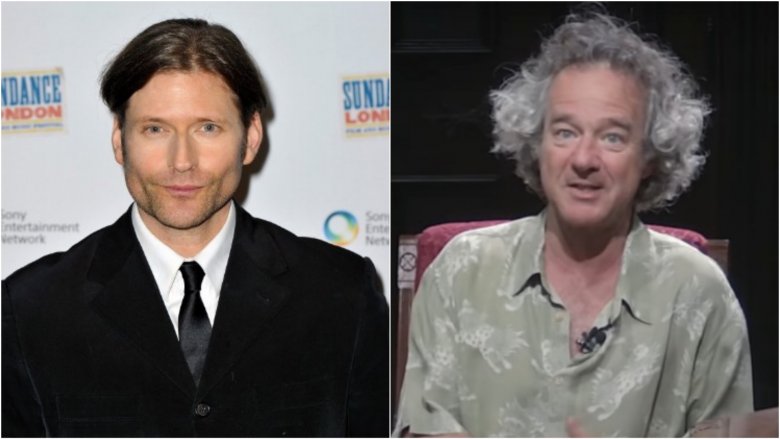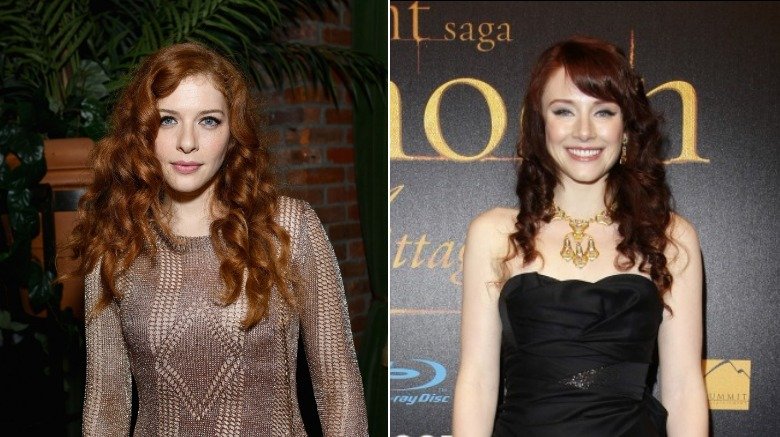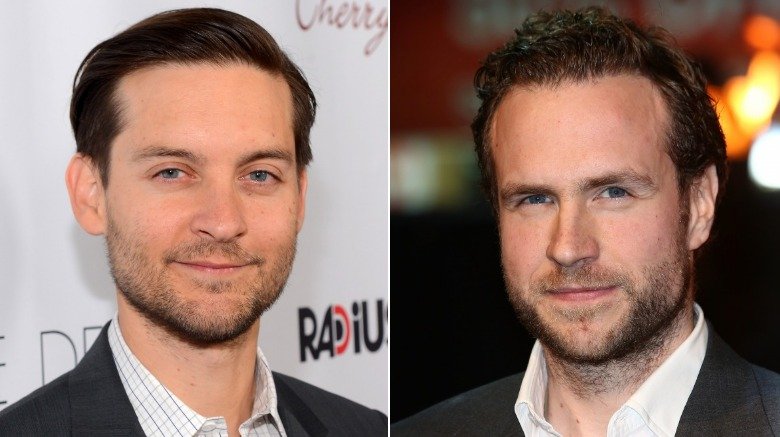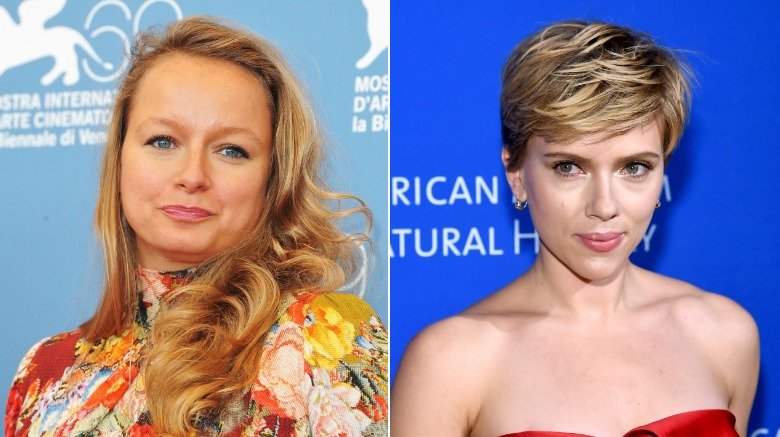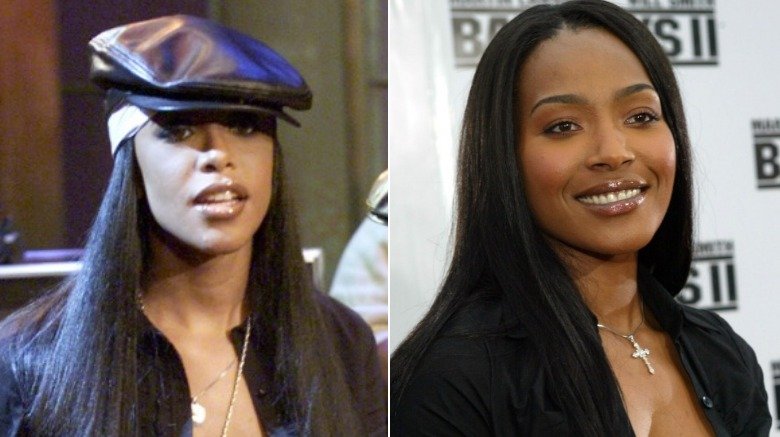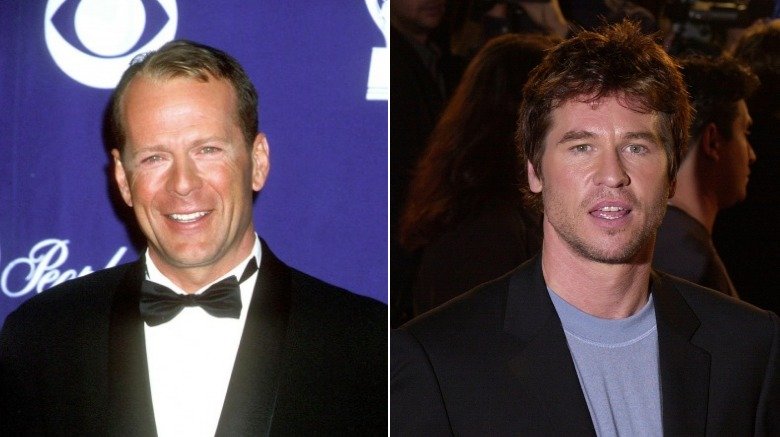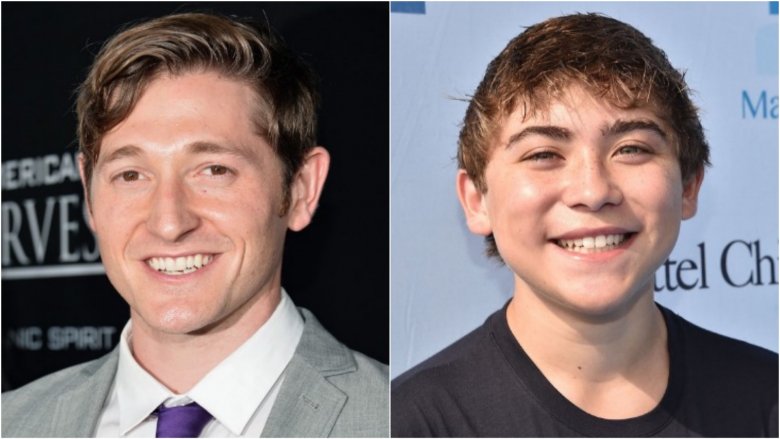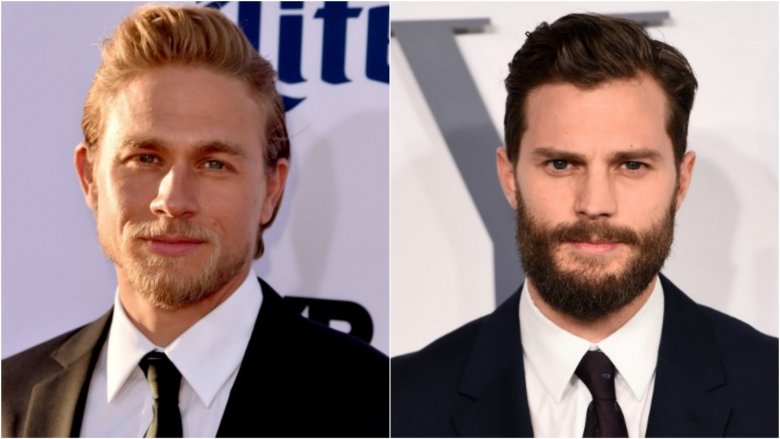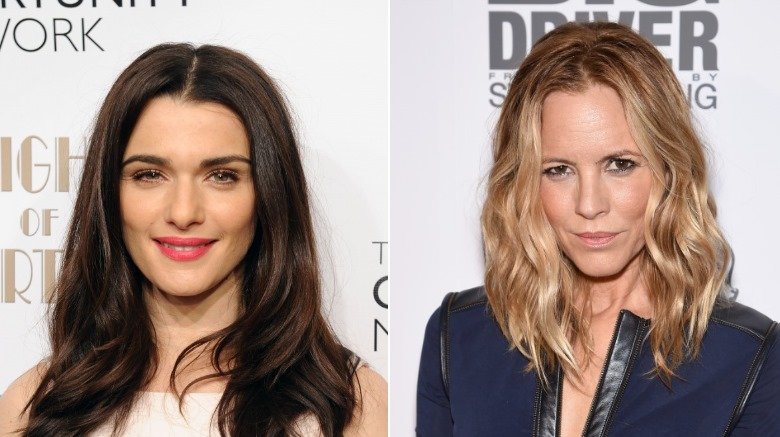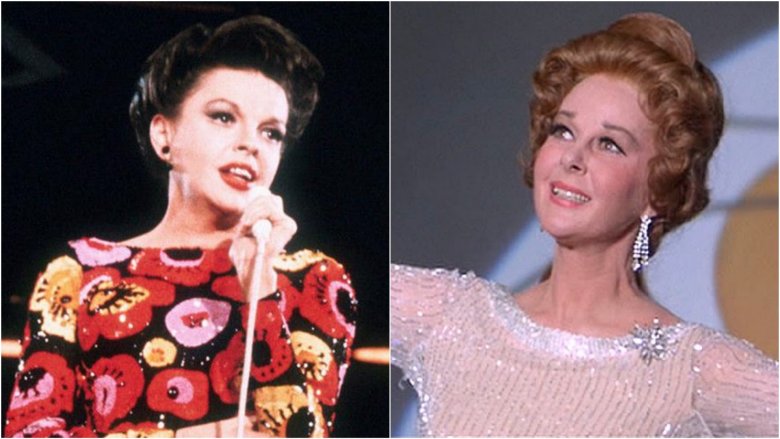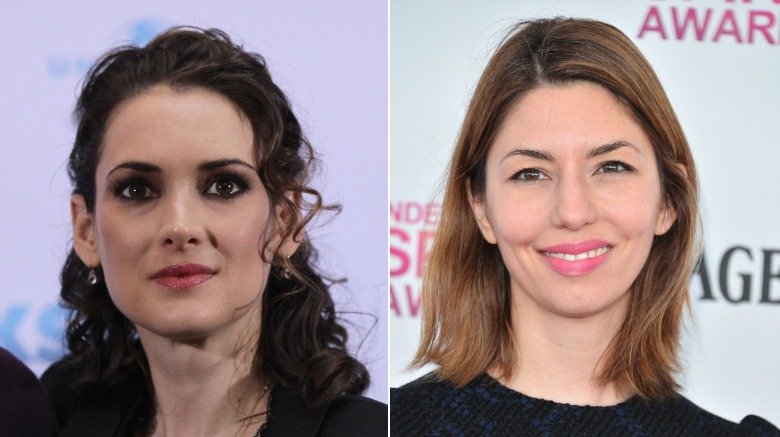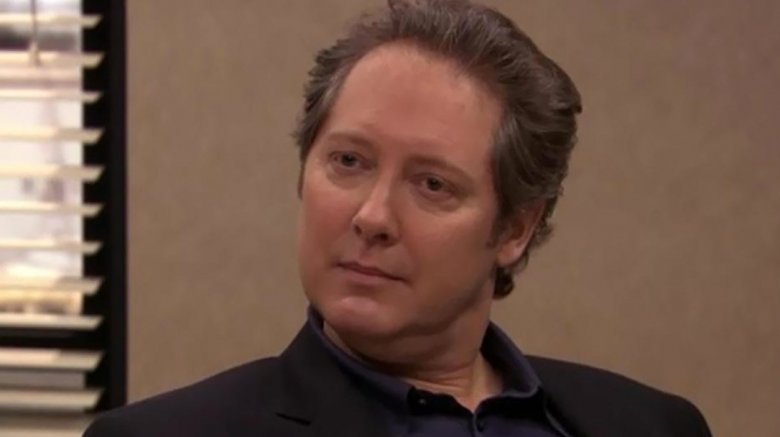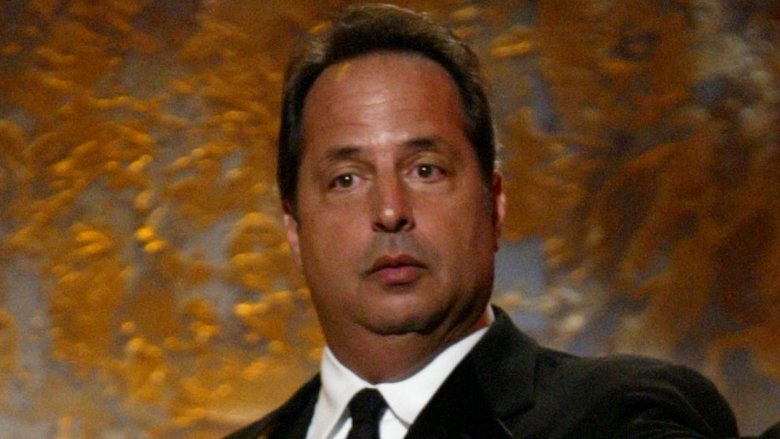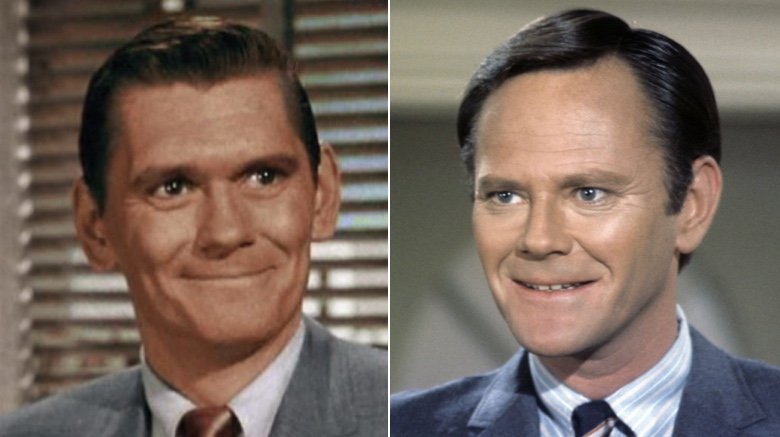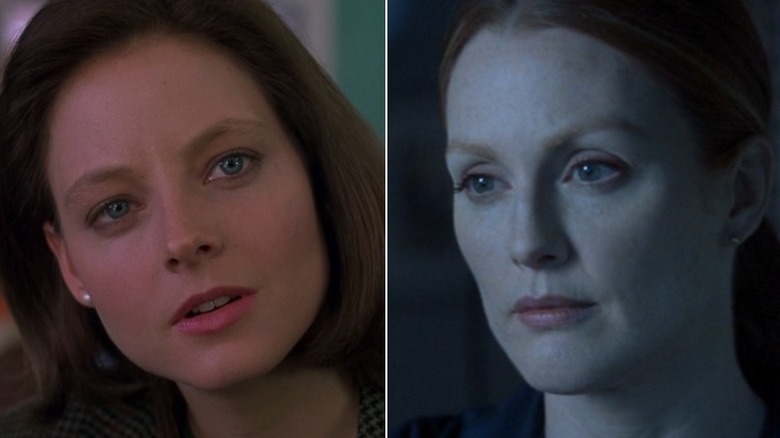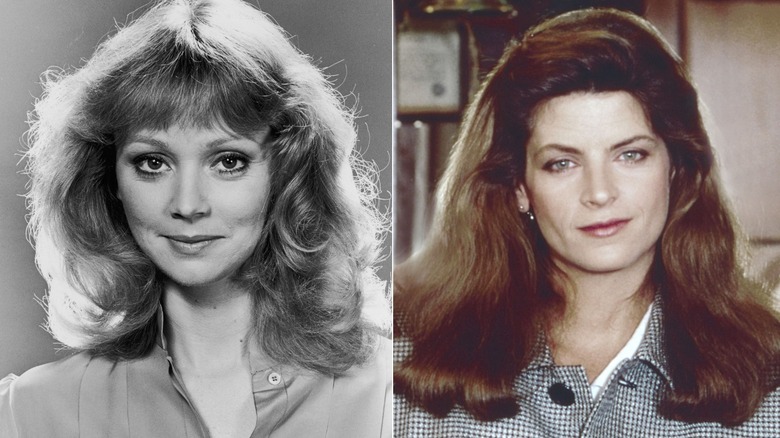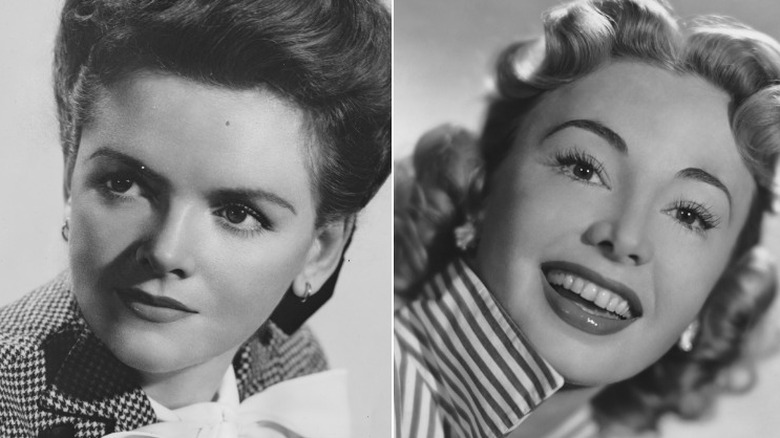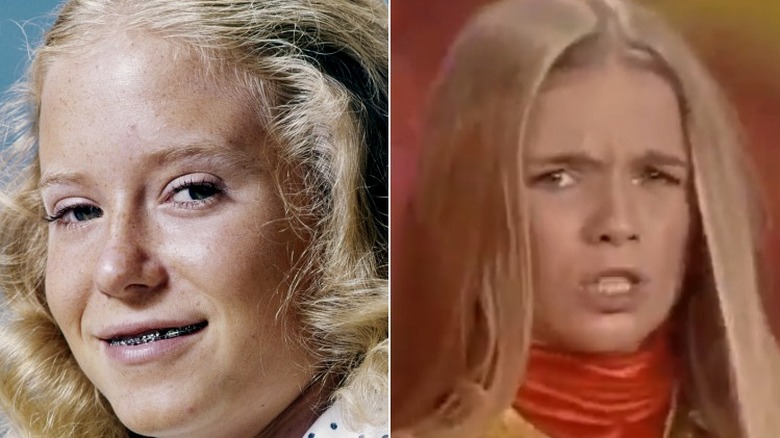Actor Replacements That Upset The Rest Of The Cast
Casting a movie is an overlooked art. No matter how good the script is, or how visionary a project's director may be, if a cast doesn't work well together, it's unlikely the resulting film or television show will be successful. Casts can get disrupted for a variety of reasons — sometimes schedules change, sometimes personal problems can lead an actor to drop out. Producers might even decide after shooting has begun that a cast member just isn't right for the part. Whatever the reason, the change can't help but affect the remaining cast members, who experience everything from sadness to frustration when shooting is thrown out of whack and a replacement actor steps in.
With that in mind, we're taking a look back at some actor replacements that really upset their fellow cast members. In some cases, things still turned out well — or even better — for the films in question. In others, it spelled doom for the experience of the cast and the movie's chances of success.
Marty went back to the casting director
There's no question that Lea Thompson's role as Lorraine McFly in the 1985 Robert Zemeckis classic "Back to the Future" shaped her career. "The best thing it did was establish me as a good actor," said Thompson during a reunion of the cast in 2015.
One career it didn't end up having that effect on was that of actor Eric Stoltz, who was originally cast in the lead role of Lorraine's son Marty, a time-traveling teenager who's sent back accidentally to the year 1955. Stoltz was replaced with actor Michael J. Fox a little over a month into shooting. Thompson said she was "very good friends" with Stoltz, "so it was very difficult for me."
Fellow castmate Christopher Lloyd, who starred as inventor Doc Brown, gave a radio interview in 2012 and described the moment the cast found out Stoltz was history — during an intense period of night shooting after he'd been working with Stoltz every night for three weeks. During a 1 a.m. "lunch break," Lloyd said producer Steven Spielberg showed up with some "other suits from Universal" who "made the announcement that they were going to make the change. It was kind of like a wake."
Noting that Stoltz was a "very good actor," Lloyd claimed producers needed "someone with more of a comic flair" in the role and added that he was "terrified" that when he re-shot his scenes with Fox "all over again" he worried he wouldn't give a good performance, "but it worked out." Great Scott, did it ever.
Papa McFly also went through some changes
Stoltz might have been the first actor replaced in the "Back to the Future" franchise, but he certainly wasn't the last. Crispin Glover, who played patriarch George McFly, was ousted and replaced by actor Jeffrey Weissman in "Back to the Future II" and "III." Over the years, Glover has said that his quibbles with the ending of the original film angered Zemeckis, arguing that seeing the McFly family rewarded with a lavish lifestyle "basically makes the moral of the movie that money equals happiness."
Glover also said producer and co-writer Bob Gale inaccurately claimed that he asked to be paid as much as Michael J. Fox for "Back to the Future II." Glover said the real problem was that he was being offered "less than half of what Lea Thompson and Tom Wilson — who had similar sized roles" made.
Whatever the reason, Thompson was upset at this second McFly family replacement, saying the actor was: "a bit of a handful," but that with Glover, "you definitely got your money's worth."
Weissman actually wore a latex face mold to look more like Glover, and said his fellow actors barely bothered to learn his name; Thompson even took to introducing him to people as "the guy playing Crispin." Glover would later win a settlement from Universal for using his likeness without his permission.
Victoria was cut off from the Twilight franchise
The young adult romance of high school student Bella Swan and her vampire beau Edward Cullen captivated readers around the globe, which translated into major ticket sales for the resulting "Twilight Saga" series of films. The supernatural dramas saw covens of vampires clash against families of werewolves in the Pacific Northwest. One of those rivalries concerned Victoria, an Elizabethan-era vampire who swore revenge on Edward for the death of her fellow coven founder James.
In "Twilight" and "New Moon," Victoria was played by Rachelle Lefevre. In "Eclipse," however, Victoria didn't seem like her old self — Lefevre was replaced by Bryce Dallas Howard for Victoria's final screen appearance. Summit Entertainment and Lefevre had an awkwardly public battle over the move, with Lefevre saying she was "stunned" and Summit countering that they were "disappointed" by her "attempt to make her career choices the fault of the studio."
Whether the fault lay with Lefevre's scheduling or Summit's ruthlessness, the switch was hard on Lefevre's castmates. Jackson Rathbone, who played Cullen coven member Jasper Hale, said, "Rachelle's a dear friend, and I'll miss her terribly." Peter Facinelli, who starred as Edward's adoptive father Carlisle Cullen, agreed: " I'm deeply saddened ... I love [Lefevre] like a sister." A source close to the production told E! News that Lefevre "was, for many of her young co stars, the on-set mother hen."
Life of Pi's reporter needed an actor edit
Ang Lee picked up a best director Oscar for "Life of Pi," his film adaption of Yann Martel's Booker Prize-winning novel in which a man retells the story of his weeks surviving a shipwreck at the age of 16. Adrift on the Pacific Ocean, with only a Bengal tiger in his lifeboat for company, his story is told to a writer who in Lee's final film is portrayed by actor Rafe Spall. This was actually the second time that actor Irrfan Khan, who played Pi, related the tale. The first time he told his story on film, it was to Tobey Maguire.
Lee ended up removing Maguire after shooting wrapped because he felt his presence took away from the story. "I misjudged the situation," he said. "I underestimated the power of stars." Insisting that he "loved Tobey," who the director had worked with previously in the 1997 film "The Ice Storm," Lee explained: "It's a small part. So when it's a movie star sitting there, it captures attention. It didn't really work out."
Khan was jarred by the recasting, as it meant he had to re-shoot those scenes. "I was finished with the film. I had deleted everything from my system," Khan said. "And to do it again, it needs a huge emotional investment." Still, it ended up working out. "It gave me an opportunity to work on it again," Khan explained. "I learned that from Ang, to use it constructively."
The voice of Her was not her own
In Spike Jonze's 2013 science-fiction romance "Her," Joaquin Phoenix stars as Theodore Twombly, a man who stumbles through his romantic life, struggling to let go of an ex-wife and romantically commit to another person, and downloads a personal assistant program outfitted with an artificial intelligence named Samantha. His relationship with Samantha grows quickly beyond calendar entries, evolving into something more personal as she evolves her own programming.
Twombly falls in love with Samantha, who exists only as an ever-present voice in his portable earpiece, and the pair begin a virtual relationship. During filming, Phoenix had a real-life Samantha to deliver his lines to. "Samantha [Morton] was with us on set and was amazing," Jonze said. However, as with Tobey Maguire in "Life of Pi," when Jonze got to the editing room in post-production, he realized what the "character/movie needed was different," and ended up recasting Samantha with Scarlett Johansson.
This required four extra months of recording sessions for Phoenix, who got pretty testy when the Los Angeles Times asked him what he thought about the decision. Saying he started "radiating scorn" after the question was asked, the Times alleged that "the conversation continued but never recovered." Phoenix ended up calling the reporter 10 days later to praise Morton. "She was my partner," he said. "She was always in my head. She created Theodore as much as I did."
The Matrix Reloaded, but she was impossible to replace
The effect of "The Matrix" on modern cinema is undeniable. From "bullet time" to its sleek costumes, it's been called "the most influential action movie of its generation" by Entertainment Weekly.
There was a lot of pressure to deliver satisfying sequels to the 1999 genre-defining cyberpunk fantasy, and it only increased when numerous production issues led a fervent fanbase to question if the series was cursed. Gloria Foster, who played the Oracle, passed away just after the filming of second installment "The Matrix Reloaded." It was the third in a series of deaths linked to the production, the first of which occurred when star Keanu Reeves' girlfriend Jennifer Syme was killed in a car accident in the spring of 2001.
Aaliyah was initially cast as Zee in "The Matrix Reloaded," but the singer and actor was killed in a plane crash just four months after Syme's death. "It was a really hard loss for the film," said co-star Harold Perrineau in an interview. "It was a really hard loss personally. It was a really hard loss for the community of music and entertainment. And we'll miss her." The re-audition process took many months; eventually Nona Gaye, daughter of singer Marvin Gaye, was cast to replace Aaliyah and Zee's scenes were reshot.
He voted himself off The Island of Dr. Moreau
The drama on the set of 1996's "The Island of Dr. Moreau" is so dense it filled the feature-length documentary "Lost Soul: The Doomed Journey of Richard Stanley's Island of Dr. Moreau." It may have started when Bruce Willis had to drop out of the lead role and director Richard Stanley was reportedly told the only way to save the film was to hire Val Kilmer, who ultimately realized his leverage and allegedly started making demands.
He wanted his shooting schedule cut by 60% and asked for a less demanding role, leading the production to fire James Woods and hire Rob Morrow to fill Kilmer's shoes so Kilmer could take over Woods' part ... and then Morrow ended up quitting.
In the midst of this, Stanley himself was replaced by John Frankenheimer, and Kilmer's disruptions continued. According to crew members, he would arrive late, change dialogue, and bully the cast and crew. One witness reported that he intentionally burned a cameraman "right on his face" with a cigarette.
Kilmer's behavior also led him to a feud with co-star Marlon Brando. Kilmer repeatedly refused to emerge from his trailer until Brando was on set, and Brando would only come to the set after a private discussion with Frankenheimer. According to the director, this led to days going by without any footage being shot, as extras sat around in their makeup and full costumes in the heat.
This change ended up making most of the cast extinct
Changing directors often leads to cast reshuffling, and when Pixar's 2015 film "The Good Dinosaur" replaced director Bob Peterson with Peter Sohn, it spelled pink slips for most of the film's voice cast. Though the all-star ensemble, which included Neil Patrick Harris, John Lithgow, Bill Hader, and Judy Greer, had finished their recording, Sohn decided that he needed to find "a younger" voice for main character Arlo, an orphaned Apatosaurus, and replaced 29-year-old Lucas Neff with the voice of 13-year-old Raymond Ochoa.
"Everything else, all the other characters that supported that story," Sohn explained to Yahoo Movies, "changed and evolved and through that evolution," and this meant some of the supporting cast "changed out of it." Sohn sent Harris, Lithgow, Hader and Greer packing. Lithgow was quoted in 2014 as saying he expected to be re-recording some of his dialogue following the change in director, so clearly the cast didn't expect to be cut. Though Sohn claimed the film's previous stars knew about the change "earlier than when it was released in the press," only a few months before the film's release, the director still referred to the situation as "a tough thing."
He was too tied up to tie up Dakota
When Charlie Hunnam and Dakota Johnson were announced as the stars of "Fifty Shades of Grey," the bondage-laced erotic tale based on E.L. James' internationally best-selling book, the fan reaction was fierce. Johnson and Hunnam weathered the storm together, with Hunnam telling the press that he and Johnson had "a real chemistry" and adding, "When they called me and told me, 'We would love you to do this,' the first question I asked was, 'It'll be Dakota, right?'"
Yet that chemistry wasn't enough to keep Hunnam on board. Four weeks before shooting was set to commence, he dropped out, citing scheduling conflicts.
Johnson later explained during an interview with David Letterman that it was "a confusing moment" for her and laughed awkwardly as she explained that Hunnam's "schedule conflicted." Letterman replied, "So that guy is gone, and then you have to begin the process all over again," and Johnson agreed, "yeah. That was a weird moment."
Hunnam's replacement, Jamie Dornan, seemed to mollify some fan objection but by all accounts lacked the "chemistry" Johnson reportedly had with Hunnam. Their press tour was low energy, and as a video Q&A session with Glamour magazine shows, the two both drew a blank when asked to come up with words that described each other, landing on awkwardly generic answers. In an interview with Today, the pair joked that they hated each other, but somehow it came off more authentic than their compliments had.
A Mummy mommy swap
1999's "The Mummy" is late '90s action-adventure classic, but at the time it was a surprise hit for Universal Pictures, taking in over $400 million worldwide and cementing co-stars Brendan Fraser and Rachel Weisz in young Hollywood. The pair would go on to film "The Mummy Returns" in 2001. The next sequel, "The Mummy: Tomb of the Dragon Emperor," took seven years to reach screens, and when it did it was missing Weisz as Evy, Egyptologist and now wife of Fraser's American adventurer Rick O'Connell.
John Hannah, who played Weisz's brother Jonathan in the series, explained: "That was a pretty Hollywood moment. I couldn't really figure out how Jonathan would be in it if Rachel wasn't — it never occurred to me that they'd just recast it." Hannah claimed Weisz was initially on board for "Tomb of the Dragon Emperor," and filming was delayed when she had a baby, "but something changed, and the role wound up going to [Maria] Bello."
Fraser soldiered on with the new version of his wife but said of the switch: "I felt Rachel's absence when I read the screenplay the first time ... we were partners, we were colleagues, we were friends, and I couldn't read the screenplay and not think about hearing her say it this way or that way. We had that chemistry." Things got ugly when director Rob Cohen claimed that Weisz's vanishing act was due to the script's contention that Evy was now mother to an older son, something she's denied. "I got a very angry phone from her agent, saying she'll never play the mother of a 21-year-old," Cohen alleged in an interview referenced by Digital Spy. "I said, 'Okay, good, fine, bye.'"
Through the shadow of the Valley of the Dolls
1967's pill-popping, Hollywood-skewering camp classic "Valley of the Dolls" was drawn from Jacqueline Susann's bestselling book of the same name. Susann, an aspiring actor and novelist with one well-received book to her credit, modeled the novel on actual show business personalities. The onetime confidant of Broadway legend Ethel Merman, Susann incorporated her into the text as fading star Helen Lawson, and the temperamental yet talented Neely O'Hara was a clear portrait of Judy Garland.
Hewing almost uncomfortably close to the book's gossipy roots, Garland was herself cast in the resulting film as aging stage glory Helen. Patty Duke was enlisted to bring Neely to life. "I worshipped her," said Duke of Garland in a 2009 interview. "She made me laugh every time she looked at me." Duke claimed two days into their shoot, Garland was unceremoniously fired from the production at the command of director Mark Robson, who the "Patty Duke Show" star called "the meanest son of a b**** I ever met in my life."
"[Garland] had to come in at 6:30 in the morning, and [Robson] wouldn't even plan to get to her until 4 in the afternoon," said Duke, claiming the "down to earth star" didn't mind waiting, but that during this time "gentlemen" on the set plied Garland with wine and "other things, so that when she finally did get called to the set she couldn't function very well." Duke says after Garland was fired "she crumbled ... and that was devastating." She was replaced by Susan Hayward, and a newspaper report contemporary to Garland's firing alleged "the entire 'Valley' company is in the dumps about Judy, from the executive office down to the props and grips."
Father doesn't always know best
One of the most infamous cast replacements of the modern era happened in 1990, for Francis Ford Coppola's highly anticipated "The Godfather Part III." Its well-loved predecessor, released 16 years prior, was the first sequel to ever win an Academy Award for best picture; adding to the pressure surrounding the film's release was the casting of pivotal character Mary Corleone, the daughter to Al Pacino's Michael Corleone.
The role proved much harder to cast than anticipated: rumored first choice Julia Roberts is said to have left for a role in "Flatliners," Madonna read for the part but was deemed too mature for the role, and up-and coming actor Rebecca Schaeffer was murdered on the morning of her audition. Ultimately, Winona Ryder was cast and flew to Rome for filming shortly after wrapping the 1990 film "Mermaids." Unfortunately, she took ill from exhaustion and left the project on the advice of a doctor.
This left the production scrambling to find a new Mary several weeks into filming. Coppola ended up casting his own 19-year-old daughter, Sofia. It was reported that this didn't sit well with the cast, who "whispered allegations of nepotism" on the set. Coppola herself agreed with these reports, saying: "they felt I was just too young and inexperienced." An extra was quoted saying "she couldn't pronounce the name Corleone... her father had to keep cutting and retaking the scene. She was in over her head." The critics agreed, dubbing her performance "hopelessly amateurish."
The Californication of The Office
The American version of "The Office" debuted in March 2005, mere months before Steve Carell became a movie star with the release of "The 40-Year-Old Virgin." For the next six years, he balanced a burgeoning film career with the demands of taping a weekly television series. And he performed spectacularly on the latter, making paper company branch manager Michael Scott into one of the most complex and hilarious characters in TV history. After a hefty seven seasons, Carell (and Michael Scott) left "The Office" in 2011.
Who could possibly follow that act? James Spader got the new boss gig, playing the slimy and off-putting Robert California. He couldn't quite re-create the peak-"Office" magic and cast member Rainn Wilson (Dwight) later admitted that. "It was a body blow to lose one of the greatest actors who's ever lived as the lead of your show," Wilson told HuffPost Live. "It's a really hard thing to survive, and we struggled a lot that next season — brought in James Spader, the chemistry wasn't quite right. He never really kind of fit in. His energy and the show didn't quite mesh." Spader stayed with "The Office" for just one season, and upon his departure, showrunner Paul Lieberstein explained it away to Vulture, saying, "We always kind of thought of this as a transition year."
They didn't love Lovitz
"NewsRadio" was a moderate hit but critically adored, thanks in part to its cast, led by "Saturday Night Live" all-time great Phil Hartman as pompous newsreader Bill McNeal. In May 1998, shortly after the series was renewed for a fifth season, Hartman tragically died in a murder-suicide at the hands of his wife Brynn. "NewsRadio" soldiered on, opening with a fifth-season premiere in late 1998 that found the rest of the cast mourning Bill (but really Hartman) and breaking into actual tears, followed by another episode that introduced new cast member Jon Lovitz as Max Louis, Bill's awkward replacement. Lovitz had appeared on "NewsRadio" before (as different characters), and he and Hartman had been extremely close friends, but this was still a very tough situation for all parties, and it just didn't work out. "Not putting Jon down, but he had different rhythms than we did, and it wasn't the same show," cast member Stephen Root told Uproxx. "It was a sad time. We lost a friend, and we lost a show." Writer Joe Furey added that while "it seemed natural" to bring in Lovitz," the actor wasn't to blame for his failure to mesh. "It was just a different dynamic and it wasn't the same thing anymore." At the end of Lovitz's sole season on "NewsRadio," NBC canceled the series.
Two Darrins was one too many
It's still one of the most famous character switcheroos in TV history: All of a sudden, some guy who wasn't Dick York played Darrin on the 1964-72 witch-com "Bewitched." Agnes Moorehead portrayed Endora, a witch herself and mother of witch Samantha (Elizabeth Montgomery), and mother-in-law to Darrin. She cared so little for the guy that she never got his name right, calling him Durwood and Darryl and such. In reality, Moorhead really liked Dick York. "She was fond of York and his talent, and respect his New Age-like spirituality," Herbie J. Pilato wrote in "Twitch Upon a Star: The Bewitched Life and Career of Elizabeth Montgomery," adding that "Moorehead felt his presence was key to the show's success." When health problems forced York off the show in 1969, producers brought in actor Dick Sargent to play Darrin and continued on as if nothing had changed. Moorehead was furious. At Sargent's first table read, Moorehead reportedly stood up and shouted, "I am not fond of change!" Sargent later told Owen Keenen in "We're Here, We're Queer" that Moorehead quipped, "They should never meddle with success" while he was in earshot. Sargent took that to mean that "Dick York should never have been replaced, which I thought was a very cruel and unthinking thing to say in front of me."
Hello... Clarice?
Generally speaking, the films that win best picture at the Academy Awards are artsy, or based on a finite, true story — two things that preclude a sequel, a prospect reserved for big commercial blockbusters. "The Silence of the Lambs" was the rare movie that won a bunch of Oscars and earned a blockbuster-level $130 million at the box office. Plus, it was based on just one book in a series by author Thomas Harris, so another gory psychological thriller starring Anthony Hopkins as cannibalistic serial killer Hannibal Lecter was on the table. "Hannibal" went into production in 2000, with Hopkins signing on to reprise his Academy Award-winning role. Not so eager for a rehash of her own Oscar-winning performance: Jodie Foster, who decided not to come back and play FBI ace Clarice Starling. According to The Guardian, Foster objected to the film's premise, which found Starling brainwashed by Lecter and joining him in feasting on human flesh. The script was rewritten to get around those plot points. At that point, Hopkins signed up, but Foster still said no. A "source close to Hopkins" told The Guardian that the actor was "absolutely furious" with Foster's actions. While her lack of interest initially threw the entire production into question, it was saved when Julianne Moore agreed to play Clarice.
Kirstie Alley kept Cheers in business
The NBC sitcom "Cheers" struggled in the ratings when it premiered in 1982, but by the end of Season 5 in 1987, it was a bona fide monster hit. Millions tuned in each week to watch the misadventures of the wacky batch of regulars at the eponymous Boston bar. From the very first episode, one of the show's most appealing elements was the on-and-off romance between womanizing bartender Sam Malone (Ted Danson) and the snobbish Diane Chambers (Shelley Long), a would-be writer turned cocktail waitress. Their love story perseveres through break-ups, betrayals, and Dr. Frasier Crane (Kelsey Grammer), but it couldn't withstand Hollywood ambition; Shelley Long left "Cheers" at the end of Season 5 to spend time with her family and to develop her burgeoning film career.
Long's departure was an existential crisis for both cast and crew; the Sam-and-Diane dynamic was so central to the show's popularity that many, including Danson, didn't know if "Cheers" could survive without it. Rather than try to replace Diane with a similar character, the show's writers went hard in the other direction with Rebecca Howe, an aggressive, thoroughly 1980s woman played by Kirstie Alley. Alley, best known at the time for "Star Trek II" and the mini-series "North & South," was well aware of the tricky situation she was walking into and found a novel way to break the ice: She showed up to work on her first day dressed as Long, complete with blonde wig and a "goody two-shoes" dress. The stunt quickly endeared her to her new castmates, and the show ran for another six seasons, growing even more popular and winning Alley an Emmy in 1991.
Politics kept Pert Kelton off The Honeymooners
"The Honeymooners," Jackie Gleason's landmark sitcom about a working-class Brooklyn couple, famously ran for just 39 episodes on CBS from 1955 to 1956. But before they had their own show, bus driver Ralph Kramden and his acerbic wife Alice were featured in a series of comedy sketches, first on the DuMont Network's "Cavalcade of Stars" in 1951, and then "The Jackie Gleason Show" on CBS the following year. The earliest DuMont shorts are a little different from what fans of the series might expect: Ralph and Alice's relationship is more fraught, Art Carney appears as a policeman in the first short, rather than as neighbor-sidekick Ed Norton, and Alice is played by actress Pert Kelton. Kelton was a vaudeville-trained performer with a film career stretching back to the 1920s, but when Gleason moved his operation from DuMont to CBS in 1952, he wasn't allowed to bring her along.
The reason had nothing to do with the quality of her performance and everything to do with the politics of the time. In 1950 Kelton and her husband, actor Ralph Bell, were named in the book "Red Channels," a compendium of alleged communists working in the entertainment industry published by the right-wing magazine Counterattack. Despite having little to no official political affiliations at the time, Kelton was blacklisted by CBS, much to the chagrin of Gleason. He initially refused to consider any other actress to play Alice, but eventually relented and recast the part, first with Ginger Jones for a touring live show, and then with Audrey Meadows, who made the role famous on "The Jackie Gleason Show" and then "The Honeymooners." The official line for Kelton's departure was that she had chronic health issues.
Fake Jan and the all-singing, all-dancing Bradys
One of the most notorious flops in television history was 1976's "The Brady Bunch Variety Hour," produced by Sid and Marty Krofft ("Donny & Marie," "H.R. Pufnstuf") that reunited the cast of "The Brady Bunch" for a weekly hour of singing, dancing, and comedy. The only problem was that, with the exception of Broadway star Florence Henderson, none of the original cast was all that adept at singing, dancing, or sketch comedy. The show was a trainwreck from the very beginning and lasted just nine episodes. "Talk about going from the penthouse to the basement," Henderson wrote of the experience in her 2011 memoir. Susan Olsen, who played baby sister Cindy and co-wrote a book about the disastrous series, put it even more bluntly in a 2009 interview: "It was a spectacular turd."
Not all of the Brady cast were quite so willing to make a fool of themselves; erstwhile Jan Brady Eve Plumb declined to join "Variety Hour," fearing the possibility of getting locked into a multi-year contract — a hilarious concern in hindsight. In order to keep the three-sons-three-daughters symmetry, the show brought in a new Jan, or rather, "Fake Jan" as she's come to be known: Geri Reischl, a young singer and performer who, by default, became one of the best cast members at this type of performance. Still, many in the cast were disappointed that Plumb didn't come back, especially Olsen, who had grown up beside her for five years on "The Brady Bunch." "I was happy for her and I was jealous of her," Olsen said, "because she was moving on [with her career]." Reischl, meanwhile, has embraced her "Fake Jan" infamy over the decades.
